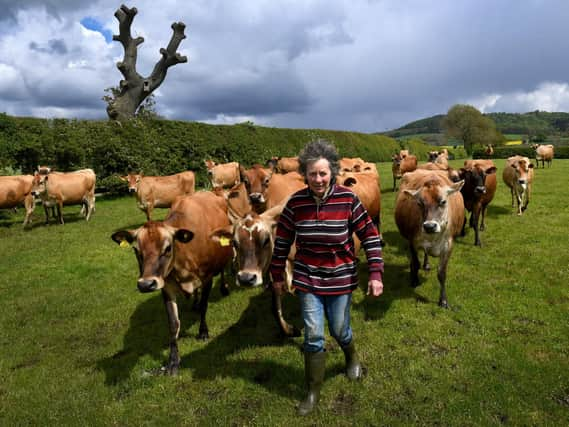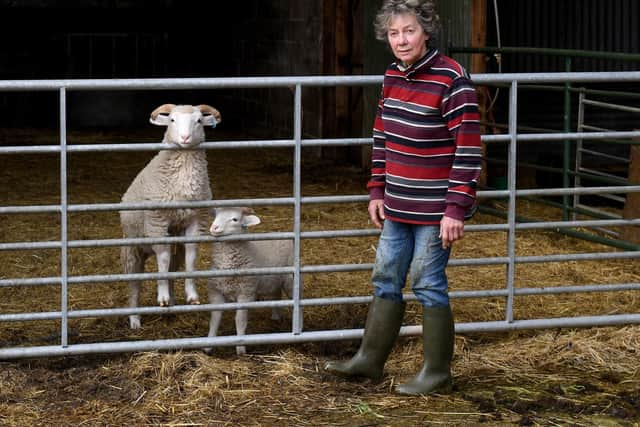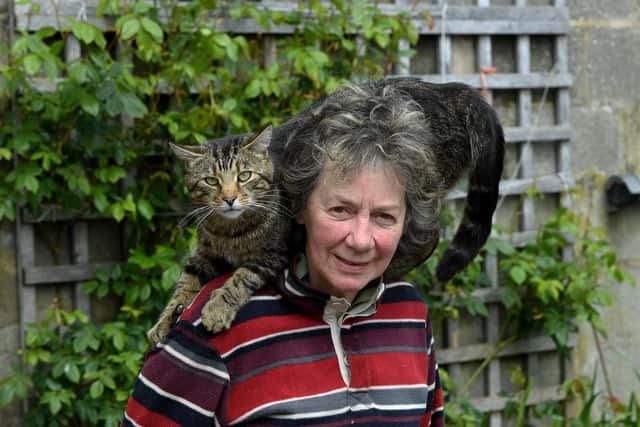Farm of the Week: The leading Jersey cattle breeder who began farming from scratch while working in a Northallerton clothes shop


Pam Crosby, of South End Farm in Knayton, near Thirsk, has gone on to become one of the most respected pedigree Jersey breeders in the country.
She has shown her cattle at the Great Yorkshire Show, has been a Jersey Cattle Society judge, held offices for the North East area and her stock when sold at pedigree sales always attracts the attention of other breeders.
Pam said her inspiration had come in her formative years.


Advertisement
Hide AdAdvertisement
Hide Ad“I used to help Jack and Val Garbutt at Rush House Farm next door to where we are now. It was where I spent most of my childhood.
“Although my parents moved to Northallerton, I would always keep coming back to do anything for the Garbutts, either looking after their dairy cows, pigs, sheep, horses and ponies. They were my first love, the horses. I used to help break them in.”
Keen to get into farming in her own right, Pam bought her first Jersey heifer for £3 prior to taking on land in Knayton, having started out renting farm buildings in Newby Wiske where she fattened calves.
“I worked for Clapham’s, the furniture and clothing store in Northallerton High Street, but I rented buildings at Newby Wiske and would cycle out there to look after them.


Advertisement
Hide AdAdvertisement
Hide Ad“I would go over to Gisburn Mart in my Hillman Husky on a Thursday, my day off, to buy calves which I would put in the back with the seats folded down. I didn’t have a trailer so I could only buy four or five at a time.
“My first Jersey was a heifer I bought from a dealer. He had paid £2.50 for it, so I bid him £3 and it was the best £3 I have ever spent. Her name was Donna and I had her 15 years. I milked her by hand, learned a lot from her and there are still direct descendants of hers in the herd today.”
Pam and Brian bought South End Farm in 1971, but only land, not a farmhouse. Pam said they spent three and a half years in a caravan.
“We bought when land prices were just starting to take off and when farms and farmhouses were getting split. The farmhouse with this land was in the village and was sold separately. We couldn’t afford both.
Advertisement
Hide AdAdvertisement
Hide Ad“We took on the field where we built our bungalow and Mr & Mrs Garbutt very kindly bought the top field so that when we had a bit more money we could buy it back from them, which we did two or three years later. It was very good of them and enabled us to get a foothold.
“Brian was working in his family’s retail DIY shop in Easingwold and I had to prove that I could provide a living from the land we had taken on because it had agricultural holding status and at the time people were buying bits of land saying they were going to retire, but then selling for lots of money.
“Originally, I had decided I was going to fill it with calves even though I really wanted to milk. I soon went that way because it made more sense.”
Pam said she learned the hard way.
“In those days I’d buy some calves that perhaps weren’t the best and I realised you could easily be buying in disease. That’s what made my mind up about the milking herd and I soon started breeding my own cows and making it a closed herd.”
Advertisement
Hide AdAdvertisement
Hide AdThe last heifer Pam ever bought-in was Broadfield Vedas Joy from the island of Jersey over 40 years ago, and Pam said it proved a pretty good purchase.
“I took her to my first Great Yorkshire Show in 1980 and it was the best show I’ve ever had, picking up a second place and a third thanks to a really nice chap I had been introduced to, Colin Clubley, who taught me how to show them.”
South End Farm runs to 33 acres with a further 28 acres rented for summer grazing. Pam’s Jersey herd is made up of 40 milkers, replacement heifers, surplus sold at breed sales and beef animals. Pam said she maximises what she has and never sought to go too big.
“I always wanted to know my cows and didn’t want them to become numbers otherwise they would become a chore. I have always enjoyed them and love what I’m doing.
Advertisement
Hide AdAdvertisement
Hide Ad“I would have liked to build up a little more, but we are very landlocked and we have taken opportunities when they have come. We bought another two fields next to us 15 years ago.”
Pam still milks twice a day in a traditional cow byre. She said if she had known the herd would have grown as much as it has they may have been tempted to put in a new milking parlour.
“It was just the money involved, justifying the spend. We are still milking the traditional way. We used to take our milk churns up the lane to be collected and we sold our milk to Longley Farm near Holmfirth for over 20 years but it has now been going to Yew Tree Dairies in Skelmersdale for the past three years.
“Our cows average around 5,300 litres, have the high butterfat and protein content that Yew Tree are looking for and they are not far from the premium price for Channel Island milk.”
Advertisement
Hide AdAdvertisement
Hide AdBeef, lamb and pork are all produced from the farm. Pam said it is all down to good breeding and quality animals.
“Jersey beef is very tender and very lean. Ours go at 19-20 months after having been out at grass and are finished on a little grain. On average we send one beast per month for processing and we have a market of friends, family and customers around the UK.
“Our sheep are Whitefaced Woodlands which we’ve had since the early 2000s. I was working at Newham Grange Farm where I first saw them. Our pigs are Tamworths and Middle Whites bought from top breeder Trish Horsley of Acaster Selby.”
Pam still retains the same positive outlook she has always had.
“I’ve never thought I’m sick of this, I can’t believe it has been 50 years!”